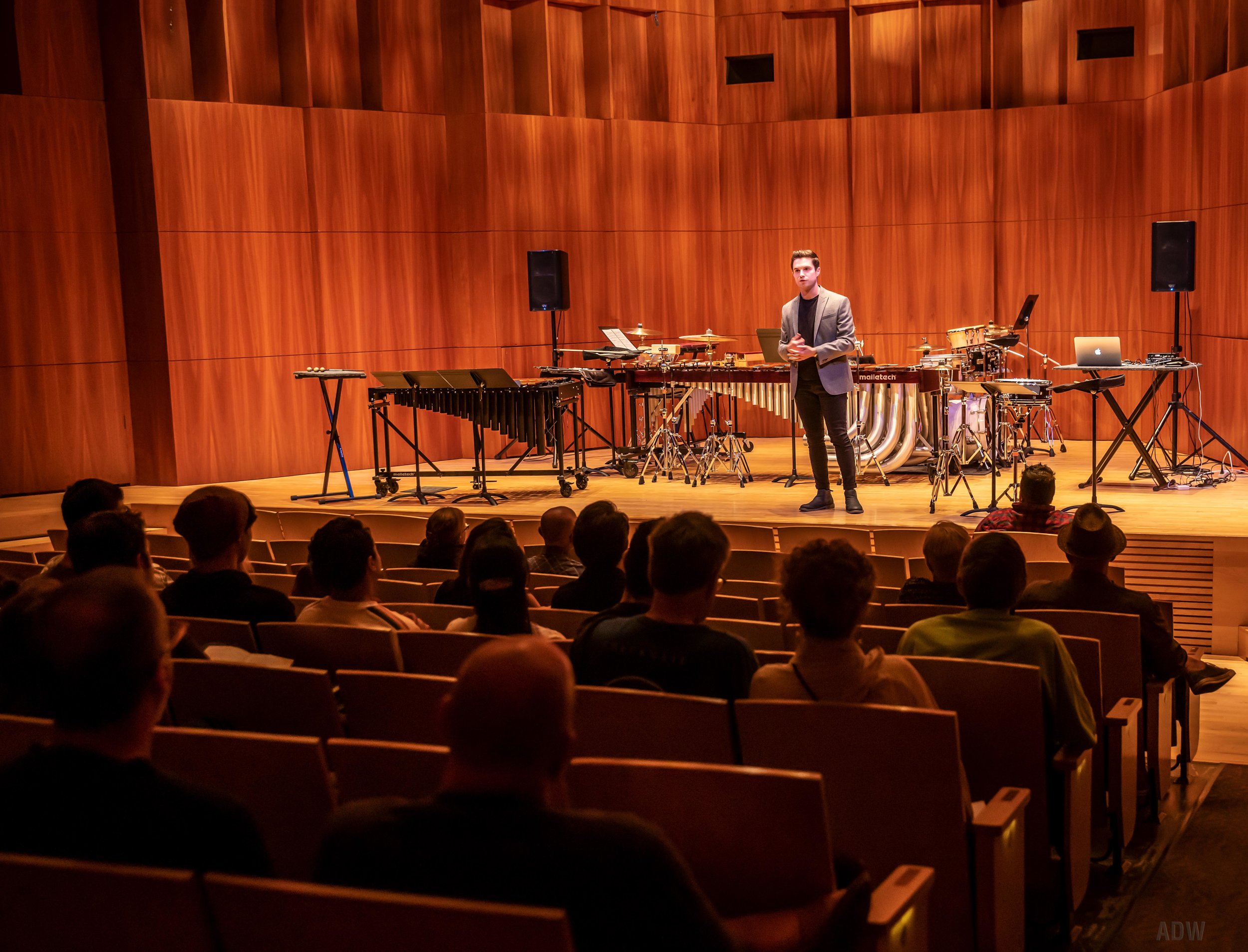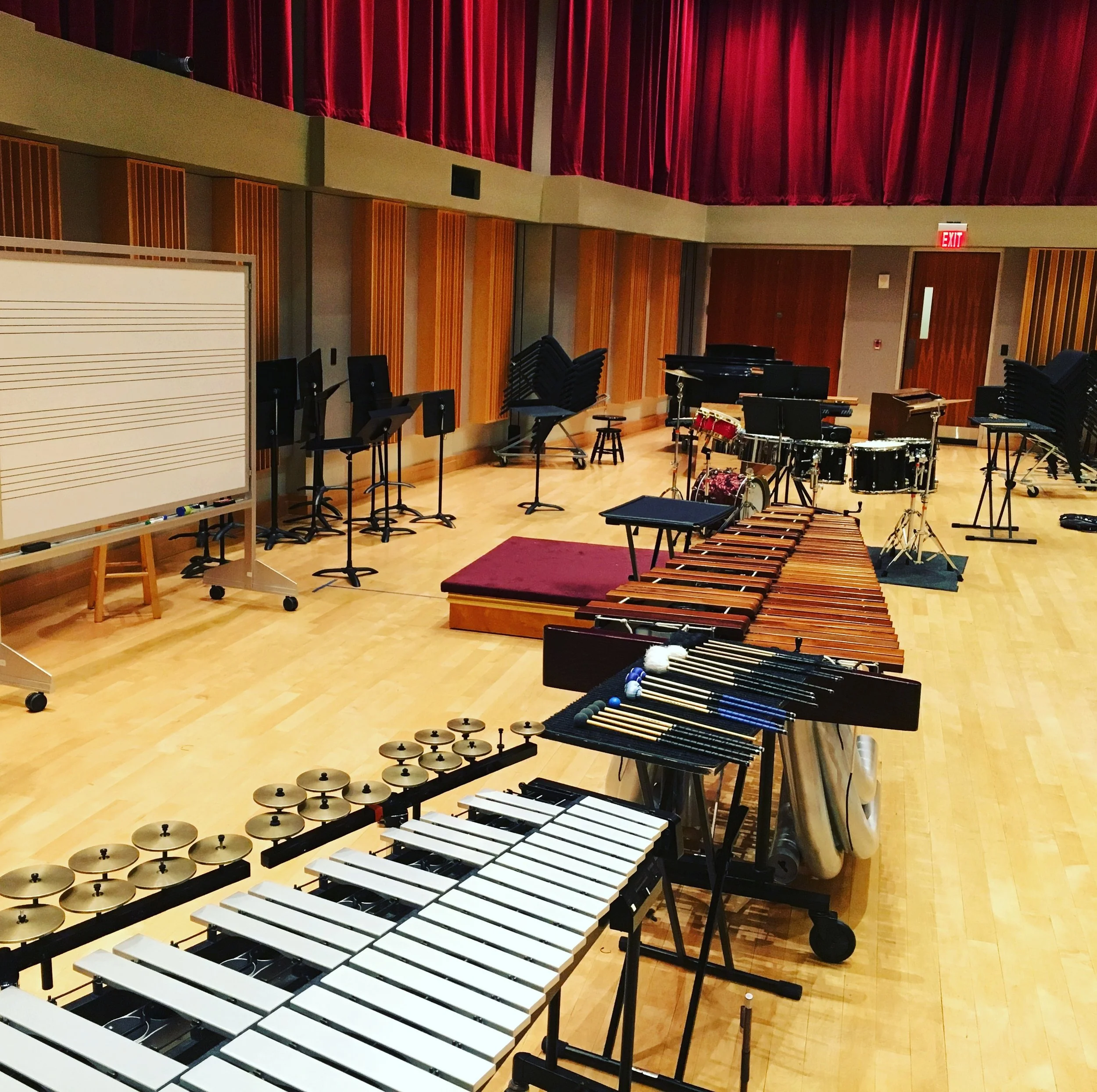BLOG
A few closing thoughts: generating income for commissions like this is hard work, especially when a majority of the money raised does not come from foundations, grants, or private donors. I believe that composers are wildly underpaid and taken advantage of (and of course, performers are too), and while I am not guiltless, I am doing my very best to course correct by raising the highest possible fees.
Attending PASIC is important for so many reasons, whether it’s learning from clinics, watching inspiring performances, or networking with colleagues. But, because it is the only organization of its kind for percussionists, it is an incredibly easy target for keyboard warriors. To that end, I find there to be a significant number of people criticizing PAS behind the scenes and intentionally boycotting PASIC, because things aren’t lining up with their own (often selfish/stylistically biased) notions of what the organization should be focusing on or doing for its members.
When I first started using social media to document my journey from graduate school to professional soloist, I wrestled with how exactly I would represent myself online. I constantly went back and forth about whether I would show what was really happening, or whether I would doctor it up a bit in order to appear more “professional.” So I experimented with both:
With any new trend or fad, there will surely be a wave of backlash from the general public (and particularly those entrenched in old ways) before acceptance begins to take hold. But whether you/we/I like it or not, social media is here to stay. Why?
Because it is no longer a trend or fad. It is now a part of our daily lives and culture, and it saves us from overusing the one resource that we can never get back: TIME.
You’ve prepared and detailed everything to the best of your ability. You’ve rehearsed and polished the piece with the ensemble. You’ve mentally compromised on in-rehearsal battles (a figure of speech, of course), some that you’ve fought and won, some that you’ve fought and lost, and some that you opted not to fight at all. The piece is finally as good as it is going to get. Whether or not you’re in love with how things sound and feel, your primary responsibility is to deliver an exciting and engaging musical product that will “wow” the audience. Hide any insecurities behind performance vibe and your poker face. Now, it’s time to perform.
Now that you've fully prepared the concerto by learning the notes, fine-tuning transitions, making intentional tempo/phrasing decisions, and communicating with the conductor, it is time to start the rehearsal process. So what is your responsibility in all of this, knowing that you have an exceptionally limited amount of time, and knowing that many people in the ensemble might not care about the piece?
Have you ever performed a concerto with a pianist? How about a full orchestra or wind ensemble? If you haven’t, then this might be a new topic, but if you have, then hopefully you can relate. The mental demands of learning, rehearsing, and performing a concerto with a supporting musician or ensemble are completely different than those of a recital, audition, or competition, and I’m going to discuss some of them in terms of: Preparation, Rehearsal, and Performance.
I alluded to this blog entry on a Facebook post earlier this week, as there are several projects in the works that I haven’t yet mentioned, and I wanted to provide a glimpse into what has been happening behind the scenes:
Last Monday, I decided to embark on {17 days ’til PASIC 2017}, the process of documenting my preparation leading up to the PAS Solo Artist Competition. It is my first foray into consistently documenting something with different kinds of content, and I wanted to share my experiences here so far.
Embracing failure is:
Not a new concept,
Restated over and over and over again,
Still important!
But, as musicians, it can feel different for us. Here’s my take on it…
This one is huge for me, and something that I struggled with for a very long time.
There is a distinct difference in being humble and being self-deprecating.
Nobody in the professional world wants their first interaction with you to involve building you back up after you continually tear yourself down. It’s exhausting for them, and that person will likely never call you back.
Why?
After traveling with the World Percussion Group and performing at the Yamaha Young Performing Artist Concert this summer, I did not touch an instrument for TWO MONTHS.
I was burnt out.
Some people think this is crazy, but I couldn’t be happier.
Here are some of my thoughts on taking time off, in both the long and short term…
In 2014, I had no clue what I was doing with my life. I had no goals. I figured I would become a band director, because I was studying music education and that’s just what you did, right?
Wrong.
One year ago, I heard about the World Percussion Group’s upcoming European Tour.
Eight months ago, I submitted an audition video that took me weeks to record and edit.
Six months ago, I woke up to a Facebook message from Tim Palmer...
Once I realized that I had no choice but to pursue solo percussion as a career, it became very obvious, very quickly, that I needed to build some sort of personal brand that could:
1. Become recognizable over time.
2. Act as a platform/hub for releasing different kinds of content.
3. Generate income.

















The current landscape of concert bookings is tedious and uncertain, particularly because most arts organizations are in fight-or-flight mode. Money is scarce, crowds are limited, regulations are strict.. and while there might be a yearning from audiences to return to the concert hall, things have fundamentally shifted. As someone whose career had just begun to hit a stride, COVID essentially halted progress. No, I’m not pitying myself, but it’s clear that the first people that presenters will have back on stage are those who are guaranteed to sell tickets and generate revenue. And for now, that still means the old guard—the standard repertoire, established performers, and an overall conservative approach. Those with burgeoning careers, in most cases, are going to have to take a backseat.